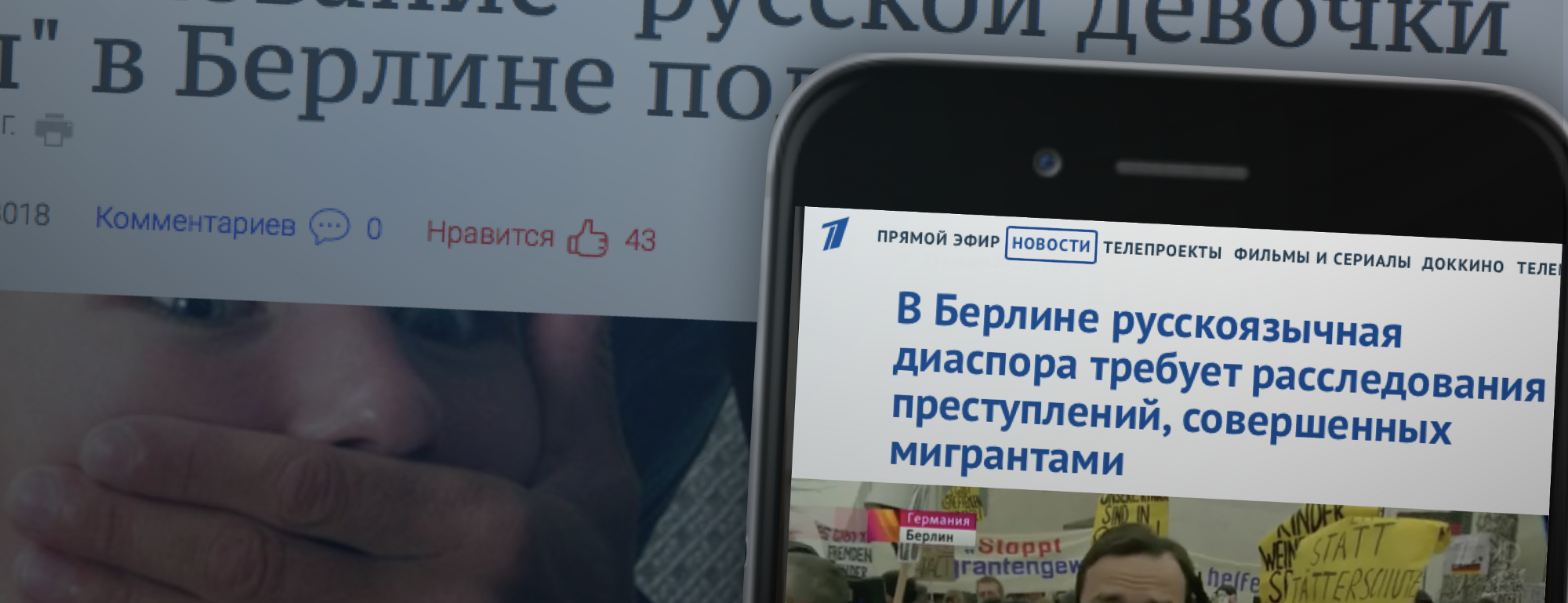
By Ben Nimmo, DFRLab
In early 2016, the subject of Russian disinformation shot up the agenda in Germany with the false story of a 13-year-old girl allegedly abducted and raped by migrants.
A year on, the girl at the center of the case is back in the headlines in Germany, and Kremlin media outlets have been using a new round of false reporting to justify the original deception.
The new case involves a prosecutor’s accusation of sex with a minor — the same girl who was featured in the original events. This serious accusation is yet to come to court, but it is already being used to generate false narratives surrounding an actual person in pro-Kremlin media outlets. It is not the purpose of DFRLab or this article to pre-empt the legal process, nor to further scrutinize a minor who has already been overly exposed in the international media.
This article’s purpose is to assess the renewed outburst of disinformation which followed the prosecutor’s announcement. Its focus is the distorted and inaccurate media coverage of the case, not the case itself, and reference to the victim and the details of the case will only be made in so far as they are necessary to explain the false allegations made.
The background: an abduction that never was
The case began on January 11, 2016, when a 13-year-old Berlin schoolgirl of Russian origin identified as “Lisa” failed to return home from school. She reappeared the following day. Her relatives told reporters that she claimed to have been abducted and repeatedly raped by three men of “Middle Eastern” appearance over a period of thirty hours.
The case caused a sensation on Russian-language social media, where the police were accused of ignoring the incident and refusing to pursue the alleged perpetrators. Kremlin-controlled TV station Perviy Kanal (Первый канал, the First Channel) ran a series of highly emotional features on it, including members of the girl’s family accusing the police of refusing to investigate, and members of the community threatening to “meet violence with violence”.
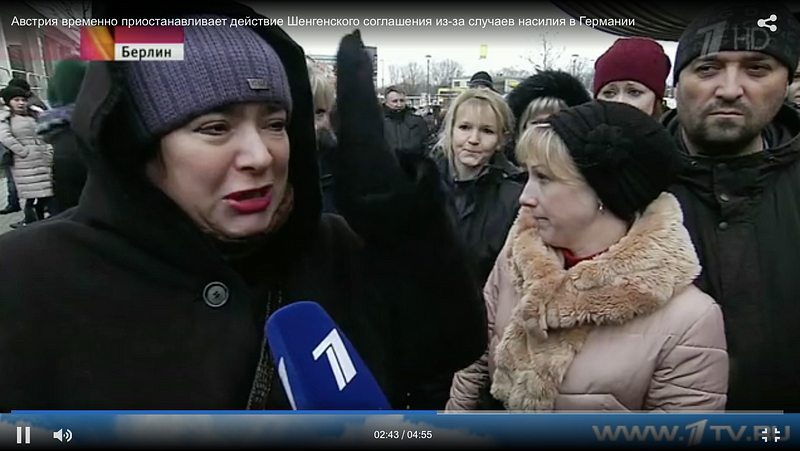
However, on January 14, and repeatedly in the following days, the Berlin police stated that “there was neither an abduction nor a rape”, based on their own interviews with the victim.
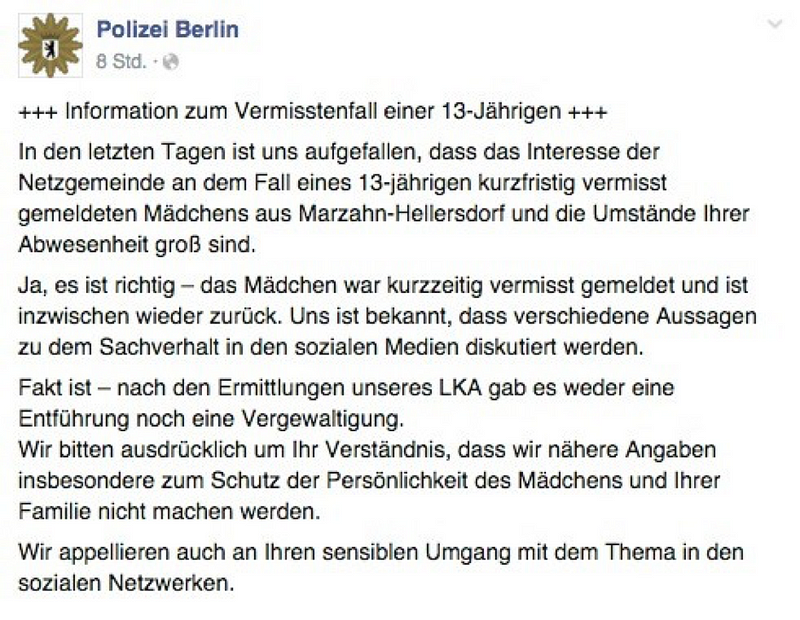
Ultimately, the police were able to demonstrate from mobile-phone records that the girl had in fact spent the night at a 19-year-old male friend’s; they further confirmed that there had been no sexual contact, and that the girl had retracted her initial story of abduction and rape.
Despite these statements, Russian-language media continued to report on the story, amplifying local activists who accused the government and German media of a cover-up, and giving their unsubstantiated accusations more credence, and more coverage, than the police reports.
On January 23, hundreds of ethnic Russians and anti-migrant activists protested against the non-existent crime and demanded a full investigation into “all crimes committed by migrants in Germany”.
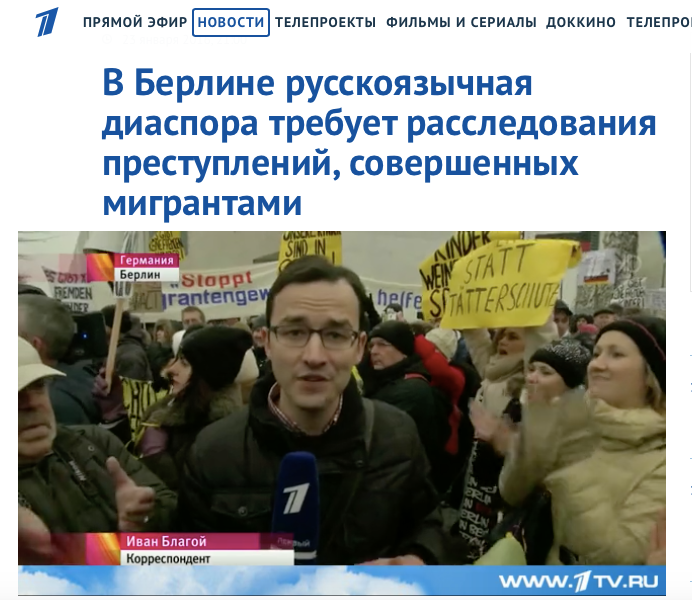
Three days later, Russian Foreign Minister Sergei Lavrov joined the attack, accusing Germany of “sweeping the case under the carpet” in the name of “political correctness” — a comment which earned a rare rebuke from his German counterpart.
The Russian media coverage of the “Lisa” case can be objectively viewed as false, in that they continued reporting incorrect and unsubstantiated accusations long after the facts had been provided, provoking both ethnic and diplomatic tensions. It continues to be cited in Germany as the foremost example of Russian disinformation.
New fakes for old
Nothing more was heard of the girl known as Lisa through 2016. However, on February 27, 2017, German tabloid Bild reported (paywalled) that the Berlin state prosecutor was launching a criminal case against a 23-year-old German citizen for underage sex with her, some time before the January events. A second, younger German citizen had been investigated but released, having proven that he did not know the girl was underage.
The story was quickly verified by numerous other German media outlets, including dpa, Frankfurter Allgemeine Zeitung and Spiegel Online. Based on statements from the prosecutor’s office, they reported that the investigation had been launched after WhatsApp messages with the men were found on the girl’s phone, that the sex had been consensual, and that it had occurred in autumn 2015. The case was a criminal one because she was under the age of consent at the time.
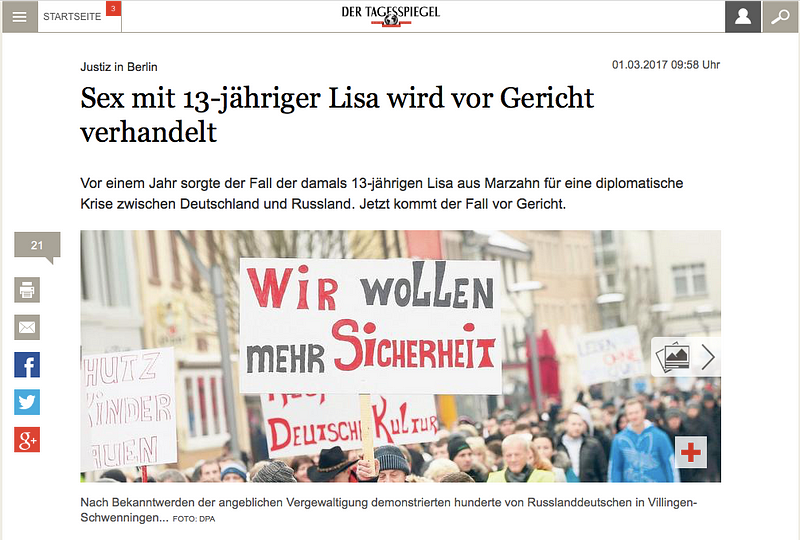
Crucially for an understanding of subsequent events, the Berlin prosecutor’s office confirmed that there was no connection with the January allegations. This was not an instance of new evidence coming to light in an old case: it was an instance of a separate case entirely.

Nevertheless, a number of Kremlin-funded and pro-Kremlin media wrongly portrayed the prosecutor’s announcement as proof that the original fake story had been true, and that German media and police had covered it up. Given that the facts — especially the timing of the alleged sex acts, months before the January events — were widely in circulation from the time of the Bild report’s publication, this appears to be a further case of false reporting, used to justify the original one.
Reporting in German
One of the first outlets to report in this vein was News-Front.de, the German edition of an internet outlet based in annexed Crimea. NewsFront is deeply pro-separatist and pro-Kremlin, and is, according to a former employee, funded and directed by Russian intelligence.
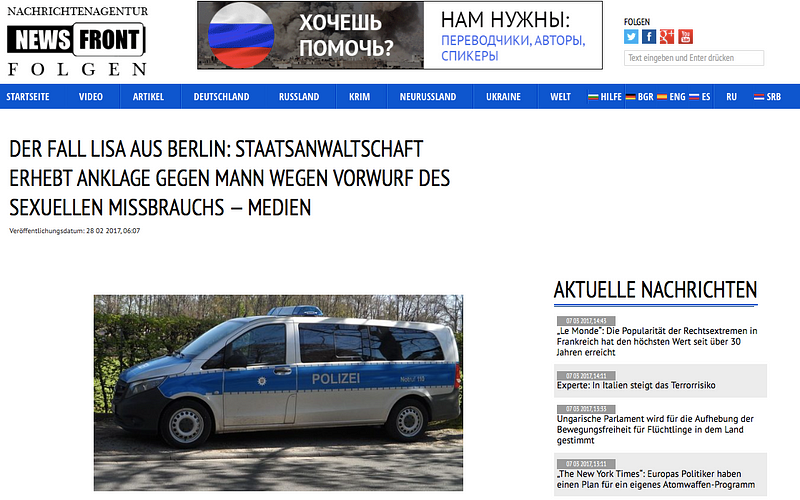
NewsFront’s article, written in poor German, picked up on the Bild report, but added its own spin: that the “system press” (a conspiratorial pejorative for the mainstream media) had been concealing the truth all along:
“In the end, the system press discredited the girl as a liar: it was all meant to be a Kremlin farce, and the Russian media were supposed to have spread ‘targeted disinformation’. But now, according to Bild, the Berlin state prosecutor has launched a case against a man. So it wasn’t all made up by a young girl after all, or why would a state prosecutor start a case after thirteen months? (…) It can’t all be as freely invented as the mainstream media swore so far.”
The Russian government’s acknowledged outlet, RT Deutsch, also reported on the new development.
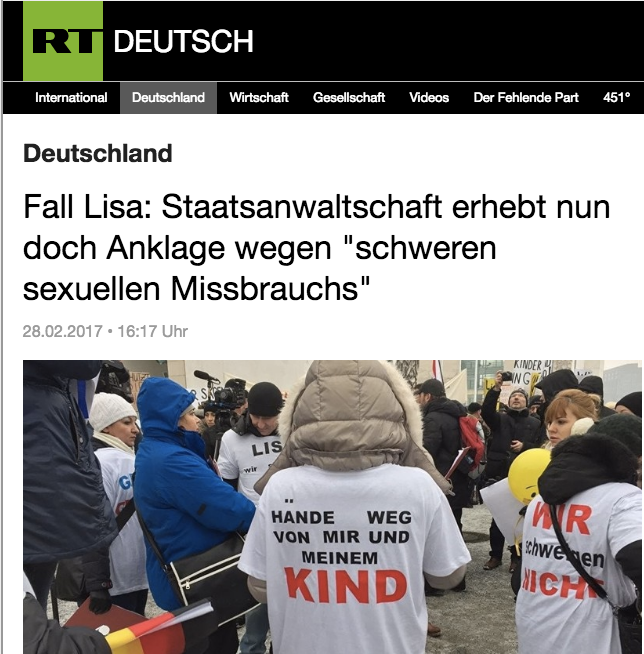
The RT article acknowledged that the new case concerned events which took place before the fake abduction; but it, too, spun the report into an attack on the German mainstream media:
“Particularly for German media, the applicable law [on underage sex] seems, if necessary, to be only a general recommendation. For months, the country’s leading media accused the girl of making up a rape.”
The article singled out individuals, such as Zeit columnist Alice Bota, who had criticized the Russian media’s approach at the time, and outlets including Bild, which it accused of “instrumentalizing the case of the abused girl for rabble-rousing against Russia”.
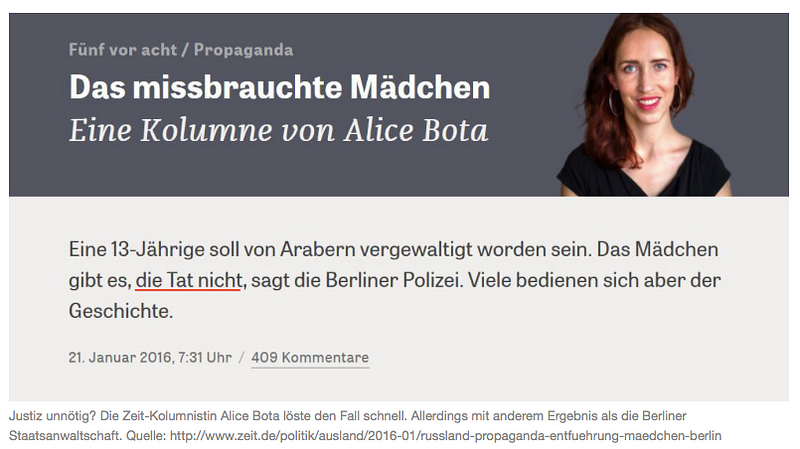
RT went on to defend the Russian-language media:
“The case of the German-Russian girl was also covered in the Russian media, which led to accusations with serious consequences. Reports which sniffed out a crime where — according to the German media — there was none, were said to be aimed solely at inciting broad swathes of society against the German media.”
It concluded on a note of either grave ignorance or gross cynicism, given that the media storm around the original story was sparked by Russian outlets: “For Lisa, who is now 14, it would surely be desirable if the German mainstream media finally gave up their campaign on the case. They have been using the name of the abused girl to stoke negative feelings against Russia for more than a year: a further trauma piled onto the victim.”
The piece achieved some degree of penetration on social media, with some 4,000 engagements, mostly on Facebook:

Could RT’s outburst be attributed to a misunderstanding, based on an inaccurate and hasty misreading of the Bild piece? It seems unlikely. The RT webstory was published at 16:17 on February 28, some sixteen hours after Bild. Sufficient time had been spent on it to provide fifteen paragraphs and three edited screenshots of mainstream media articles. Inaccurate it was; hasty it was not.
Crucially, it also acknowledged the timing of the alleged crime, “before” the January case. It cannot, therefore, be argued that the RT writer did not know that the Berlin prosecutor’s accusation concerned a different incident.
Strikingly, just before the RT piece was published, RT’s sister outlet, Sputnik Deutschland, reported the same story, but did so factually, acknowledging that the alleged sexual contact had taken place in autumn 2015. This further demonstrates that the correct information was already in circulation by the time RT published its story; it also suggests that the reaction of the various pro-Kremlin channels was not coordinated.
Russian rage
In parallel, a number of outlets picked up on the story in Russian. Here, too, there was a split between those who reported the case accurately, and those who portrayed it as a vindication of the 2016 fake.
RIA Novosti, the state-owned news wire which is affiliated with Sputnik, reported the story accurately, confirming that Lisa was not abducted, but had spent the night of January 11 at a friend’s. Online outlet newsru.com also reported it accurately.
Other outlets were more aggressive, and less accurate. On February 28, the Europe edition of leading Russian tabloid Komsomolskaya Pravda ran a report claiming that the “Berlin prosecutor admitted the fact of depraved acts against the Russian girl Lisa”. The article conflated the two cases, saying that the Berlin prosecutor’s accusations were a “more probable version of the [2016] incident” rather than a separate case, and quoting an “expert on Russian-German relations”, Andrei Schmidt:
“Unfortunately, all this time the German security services weren’t looking for real criminals as much as mythical ‘Kremlin agents’ who apparently were trying to undermine the Federal Republic of Germany with the help of an ‘information war’ around the Lisa case.”
The article was shared a modest 76 times.
The following day, online publication politonline.ru headlined its story “The rape of the ‘Russian girl Lisa’ in Berlin has been confirmed”, adding a gratuitous image of a girl with a man’s hands on her mouth and throat:
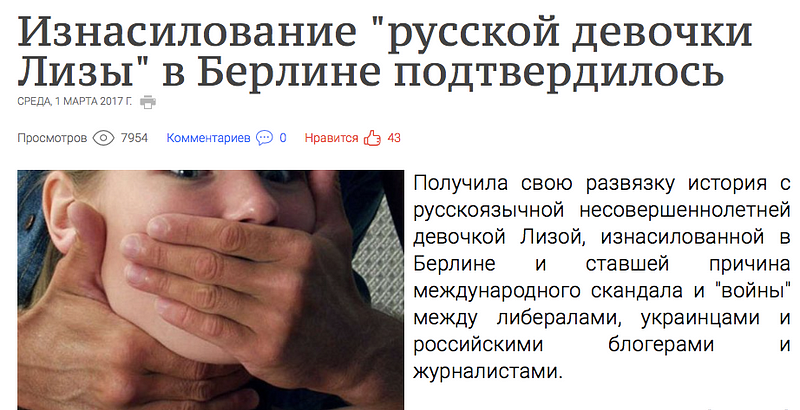
This article targeted the Western media with an open falsehood: “We would point out that neither the liberal Russian media, nor Ukrainian publications, nor the largest European media holdings saw fit to report that the rape of the girl Lisa has been confirmed.” The tab title on the web version expanded the headline with the question, “Will they apologize to Russia?”

The story achieved some penetration online, with almost 8,000 views and forty-three likes. It was reproduced verbatim by a Russian-language portal in Latvia, vesti.lv, which is known to have reproduced blatant disinformation in the past, such as the false allegation of the United States sending 3,600 tanks against Europe.
The following day, Russian broadcaster REN TV ran an interview with Heinrich Grout, chairman of the International Convention of Russian Germans. The headline set the scene: “Migrants forced 14-year-old Russian girl to have group sex in Germany by blackmail”, while the opening paragraph featured the claim that Grout “explained what the German prosecutor is hiding”.
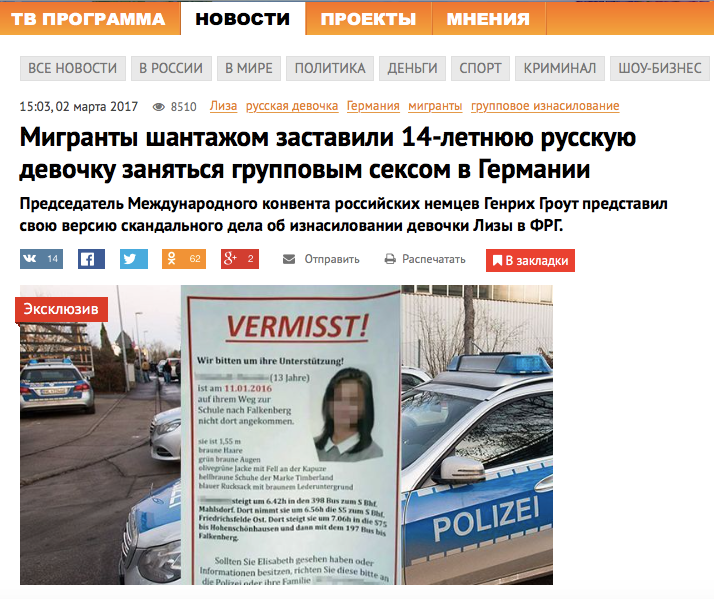
The report recycled the main themes of the original fake the preceding year: “To start with, it was reported that the girl was kidnapped and raped. Then they started to deny even the actual fact of a rape, provoking a series of protests from Berlin’s Russian-speaking population. Afterwards, the fact of a criminal case was confirmed after all.”
Despite the official announcement that the suspects were German citizens, Grout accused the Berlin prosecutor of covering up the story “in order to expose crimes linked to migrant participation as little as possible”; the interview did not challenge this assertion. The page was viewed over 8,500 times and shared 78 times on social media.
The same day, a still more tendentious article appeared on online outlet Katyusha.org. Its headline was a personal attack on Chancellor Merkel:
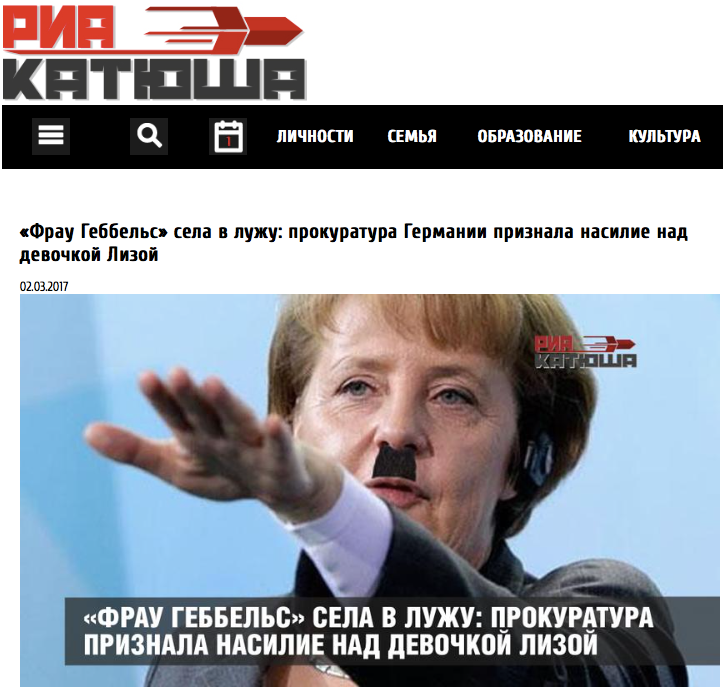
The article repeated the same arguments, accusing the West of “propaganda”, a cover-up and anti-Russian “hysteria”. It was reproduced on a number of other fringe websites in the following days:
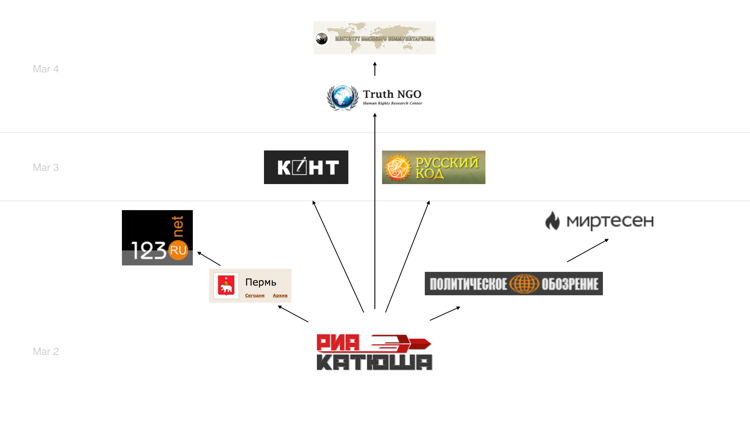
It added one new feature: a claim that the suspects in the new case were of Turkish origin. It attributed this to the BBC Russian service, providing a link to a BBC article — but that article made no reference to the suspects’ ethnic origin.
The accusations of a cover-up continued on March 6 in an opinion piece published by daily Vzglyad. Headlined “Lisa again”, the article was full of factual errors and fierce accusations:
“The case has only been launched against one of the men, the 23-year-old. The other has not been summoned to judgement — it has not been explained why.”
“It’s entirely clear that they just hushed up the (original) case. The investigation was not carried out. And the incident with Lisa became an instrument of anti-Russian propaganda.”
One of the suspects, “presumably of Turkish origin”…
The author, Nataliya Yankova, was described as a “publicist” based in Germany. She also wrote on the “Lisa” case in February 2016, well after the factual course of events had been established, accusing the Berlin police of “either professional incompetence or pressure from above” and the German media and politicians of “artificially politicizing it, like everything linked with Russia”.
Her latest offering was shared on a number of other websites, and reprinted by the Russian service of News-front, with an even more graphic image:
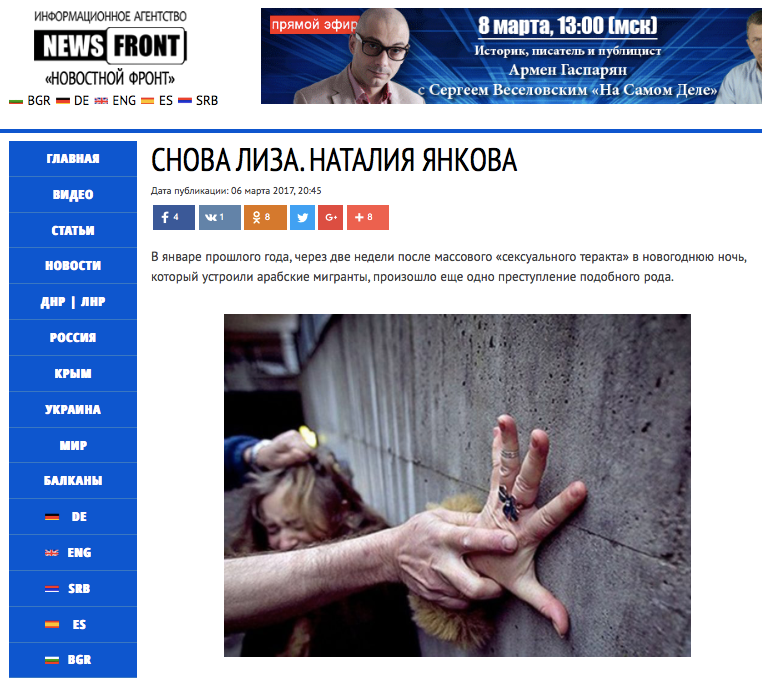
This brings the story full circle, from an initial News-front German-language post to a polemic on its Russian service. By March 8, the News-front version had been shared 21 times and picked up on a scattering of blog sites.
Conclusion
The original Lisa story was false. By refusing to accept the statement of the German police, repeatedly made, that there had been neither an abduction nor a rape, pro-Kremlin media kept the story circulating long after it had been debunked, generating significant tension and anti-migrant feeling in Russian and far-right groups.
The revival of the Lisa story, prompted by the Berlin prosecutor’s announcement, used the same techniques. The prosecutor’s statement that there was no link with the 2016 allegations was ignored; unsubstantiated comments from members of the community were given prominent coverage with no attempt to provide context or factual corrections; the blame was, once again, aimed at foreigners, without apparent evidence.
Above all, an attempt was made to retrospectively justify the original false reporting by accusing German media and officials of a year-long cover-up — using a new falsehood in the process.
By Ben Nimmo, DFRLab
Ben Nimmo is Senior Fellow for Information Defense at the Atlantic Council’s Digital Forensic Research Lab (@DFRLab). Nika Aleksejeva is a Digital Research Associate at the DFRLab.





